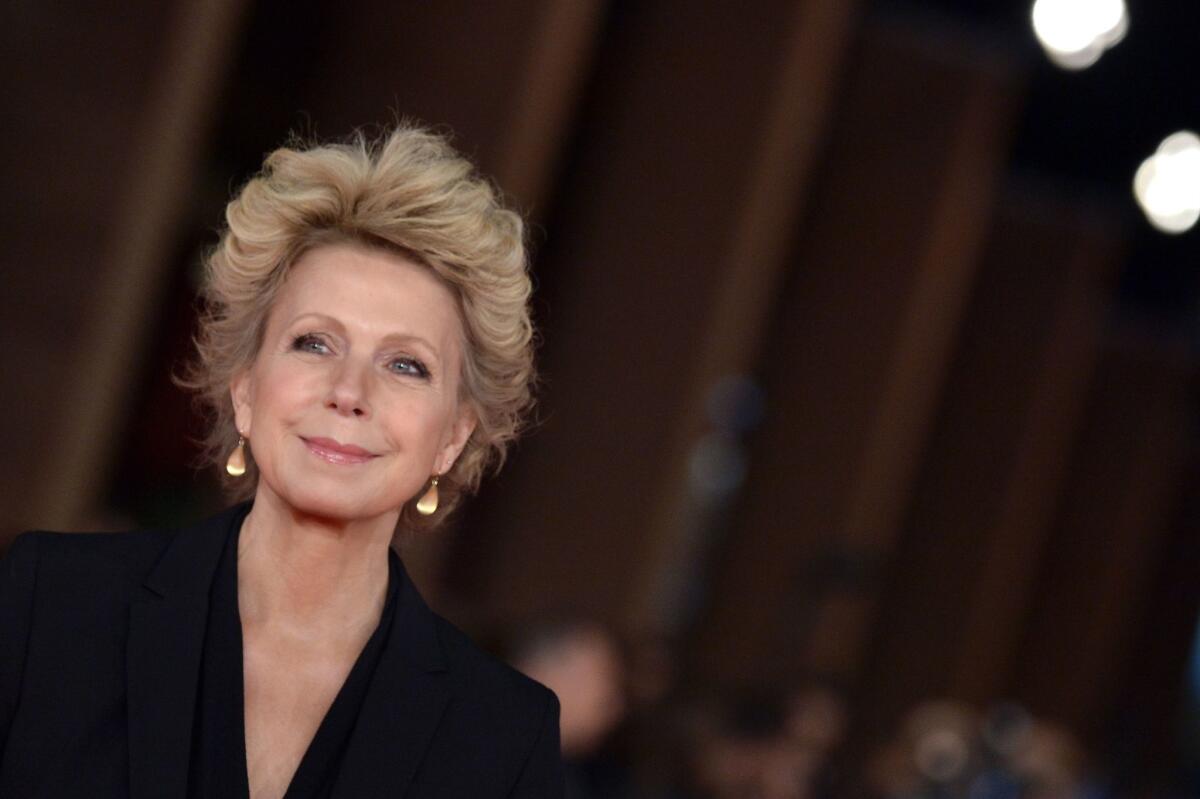Q&A: Mary Mapes describes seeing her ‘Truth’ on the big screen

Former CBS producer Mary Mapes poses on the red carpet as she arrives for the screening of “Truth’’ at the Rome Film Festival on Oct. 16.
- Share via
In director-writer James Vanderbilt’s copy of “Truth and Duty: The Press, the President and the Privilege of Power,” author Mary Mapes had written him a message:
“You have my life in your hands.”
It was back in 2006, not long after the book was published, recalled Mapes, a former CBS news producer who had given Vanderbilt the rights to her story.
Eleven years later, Vanderbilt’s film “Truth” has made its way to the big screen.
The film, which rolled out in theaters last weekend, follows the events around the 2004 “60 Minutes II” report about then-President George W. Bush’s military service. The incident got Mapes (played by Cate Blanchett in the film) fired and led to anchor Dan Rather’s (Robert Redford) resignation.
SIGN UP for the free Indie Focus movies newsletter >>
We talked to Mapes by phone ahead of the film’s release about her reaction to the film adaptation of her story.
James told me after he read your book that he called you to meet, and then flew down to Texas to chat with you in person about maybe making your book into a movie. What was going through your mind when he first approached you?
I had just gone through what was a pretty rough book tour, I had done a lot of interviews -- many of them were a close relative of hostile.
But Jamie is a really extraordinary person. I talked to him on the phone and he told me roughly why he was interested in it. He said it was for both for the journalism and the reactions when corporate media chooses to fold on you.
It was clear to me he was getting much about what I was talking about in the book and we talked a lot about his other film “Zodiac” and his fascination with journalism. It’s something he’s really interested in and loves examining all different aspects of.
Jamie first came to Dallas and we met over a period of a couple days. ... We kicked it and talked about a lot of different things. He saw my husband and my son and I guess, on some level, was probably at the time gauging who I was, and what this was like, and what it had meant to me, both good and bad.
I was pretty fragile at the time. But Jamie laid out his plan, which was that he’d go from person to person and place to place where I had put this story together, and talk to everyone from Dan to a number of other people who’d worked with me and knew me. I think it gave it a lot of layers to this story.
It was very important to me that it be understood that this was such an important team effort and that we had worked very well together.
How do you feel about this movie coming out 11 years after the events? Do you think it’s actually good timing given the current media landscape shift?
Absolutely I do. I think it’s really spectacular timing on a couple of fronts. One is that we are in the midst of another absolutely hilarious, sometimes disheartening, presidential campaign. You see what you see in every campaign -- the rapid response teams and the war rooms and the rumors, the takedowns, the debates, the rallies.
But I also think the shifting media landscape has gotten nothing but more difficult for journalists. ... I do think these are very hard times for journalism. There’s more and more of a drive for journalists to do more than one thing. You can no longer just be a reporter at a local TV station, you are also a cameraman and editor. Or you are a print reporter who has to take your own pictures. And that changes so many elements of the work. I’m not saying that reporters aren’t good now, I think they are good and multitalented and trying. But the piling on of responsibilities and obligations has resulted in people not being able to commit as fully or as completely to a story as they used to.

Why do you think it’s important for the behind-the-scenes journalism stories to make it to the big screen?
I do think there are cultural shifts that happen and people have sort of the same “maybe it’s a good time to look at this” reaction. I do think people are noticing missing pieces in our journalistic world now. We do have an awful lot of opinion and very little reporting of fact and we can’t even agree on our facts anymore.
This journalism movie has kind of resurfaced, with “Truth” and “Spotlight” and even “Black Mass,” which was based on a book by Boston Globe reporters. What’s behind the trend do you think?
In a storytelling sense, there are a couple of elements of journalism that are always there in these films.
The looming deadline, which you know. When I was watching them shoot a scene in the editing room, I was in another room watching on a big monitor. They did it four or five times, and every single time, I almost got sick to my stomach because I had all those feelings again of trying to get those damn things cut, the things I would feel when we would put together any story. I think any journalist knows that kind of pressure. I think audiences respond to the speed of which you have to work, that is a great storytelling device.
So, what did you think of the movie?
I think the movie is tremendously well done. I mean my God, it’s wonderful.
And it was amazing to watch someone like Robert Redford get at the essence of Dan so perfectly. He did things in the films just as Dan does to the extent that I didn’t even recognize that I knew those things about Dan until I saw Robert Redford doing them. For example, the way Dan stands and how he moves his head and the way he walks into a room. It was eerie.
I think what Cate captures tremendously well in the movie is this sense of despair and sorrow that I really felt, like 25 years of work had just gone poof. Everything I had ever worked so hard for -- my reputation at CBS, certainly, and everything I had worked on -- was completely smothered by this response to this one story and that was really hard to accept and understandably hard to move on from.
The first time I saw the film it was very difficult to watch. There were huge chunks of the film that I didn’t even see because I would see something in it that would send me off on a mental tangent that I’d miss the next five minutes of the film.
So the next day I went back and sat in a screening room all by myself, watched it again and was able to take it in and process it much more efficiently and completely. I think everyone did an absolutely wonderful job.
With Cate, it was like watching your old life starring someone more beautiful, smarter and taller. What’s not to like?
For more news on the entertainment industry, follow me @saba_h on Twitter.
ALSO:
‘Spotlight,’ ‘Carol’ among leading Gotham Awards nominees
The Oscars: Host Chris Rock enters stage at race-aware moment
Back to the Future Day: What the franchise sneakily got right
More to Read
Only good movies
Get the Indie Focus newsletter, Mark Olsen's weekly guide to the world of cinema.
You may occasionally receive promotional content from the Los Angeles Times.











